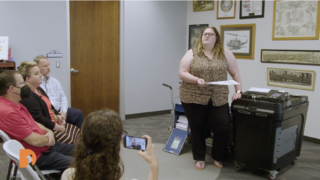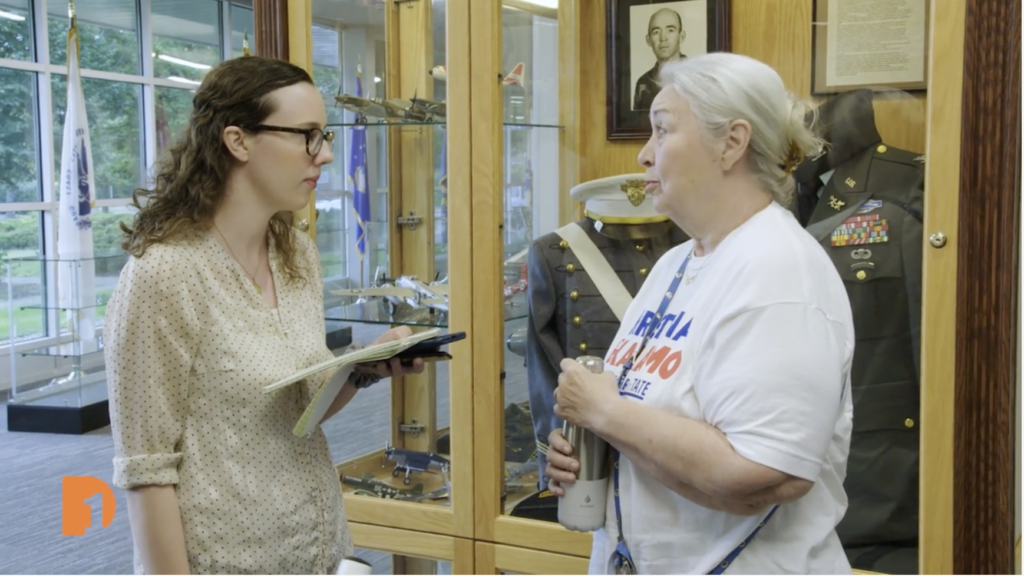After allegations of voter fraud, cheating and tampering with election results spread widely following the 2020 presidential election, some city clerks in Michigan are working harder to teach voters how the election process works. Each year, the City of Taylor, MI’s city clerks office hosts a public voting accuracy test, open to residents, to educate them about the process, but up until this year, it was rare that residents would attend.
RELATED: Behind the Ballot Box: Detroit Election Inspectors Receive Training Ahead of 2022 Primary

City of Taylor, MI Deputy City Clerk Sara El-Rifaai talks resident voters through the process of certifying a vote during an election. | Photo by One Detroit
Taylor City Clerk Cynthia Bower said the low voter turnout for the annual public voting accuracy test hasn’t been for a lack of trying, however. Announcements were made in the city’s local newspaper and posted on bulletin boards, but this year Bower’s office pushed the information out further, hoping to draw in a larger crowd. And it worked.
“In order for people to understand the process, I think it is important for them to attend things like this,” Bower said.
Heading into the 2022 Michigan primary election, One Detroit teams up with Detroit Free Press reporter Clara Hendrickson to learn more about the voting accuracy test and how results are certified. Hendrickson talks with Bower and the City of Taylor’s Deputy City Clerk Sara El-Rafaai to understand how a vote goes from the voter’s ballot to an official election result.
RELATED: Recounting Election Night 2020: Trouble at TCF Center
RELATED: Election Aftermath: An Analysis of Misinformation, Media Trust and our Democracy
They discuss how allegations of voter fraud in 2020 affected their jobs as city election officials, the threats and hate mail that was received around the 2020 election, the repercussions that come with attempts to tamper with an election at the local level, and the trust they hope to build with voters about the process.
Plus, Hendrickson ask voters who attended the public accuracy test on July 26, 2022 how helpful it was to learn about the voting process and the reservations they still had afterward.

Detroit Free Press reporter Clara Hendrickson, left, talks with a Taylor resident and voter following the city’s public voting accuracy test. | Photo by One Detroit
Full Transcript:
Cynthia Bower, City Clerk, Taylor MI: Pursuant to state law, we are required to test the voting equipment. So, every election cycle we test every machine that we use.
Sara El-Rifaai, Deputy City Clerk, Taylor MI: All right. It’s 5:30. We’re going to go ahead and plug the machine in. This is the tabulator that we use on Election Day. It’s called an ICP and Image Cast Precinct.
Cynthia Bower: That process is lengthy. Each tabulator that goes out to the precincts is tested as well as the absentee equipment and then handicap equipment that also goes out to the precincts.
Speaker 1: Do all the municipalities use the same machines or…?
Sara El-Rifaai: In Wayne County and for the majority of Michigan, there are very few counties that have either Hart or ES&S. There is only one that has ES&S. So, it’s a majority Dominion, some Hart, and then ES&S is the other vendor as well.
Speaker 1: Which are these?
Sara El-Rifaai: These are Dominion. We’ve been using these since 2017. So they have been with us for a while.
Cynthia Bower: In my ten years. In 2013, we did have a candidate attend who obviously was a resident voter as well. But in 2016, we had one resident who attended the public accuracy test.
Sara El-Rifaai: There are memory cards in here. There’s a seal number on the seals, and they’re recorded. They’re recorded in our office there, they’re recorded on the poll back. So on Election Day, the workers do have to check them to make sure everything matches and that nothing was tampered with. There is also a seal on the modem door. We no longer modem, but there is still a seal to show that it’s locked and nobody’s gotten into it.
Clara Hendrickson, Politics Reporter, Detroit Free Press: And why do you think very few people come to view this accuracy test?
Sara El-Rifaai: They may not be aware that it happens, but we do post the notice of the test in the local paper. It’s posted at the bulletin board outside of City Hall. This time we stressed that it was happening. We announced it several times during council meetings, so I don’t know if that helped people attend.
Cynthia Bower: So, I think it’s just the fact that voters are not aware that this does happen and that is why they do not attend. But in order to understand the process, I think it is important for people to attend things like this.
Sara El-Rifaai: These are test ballots, so we have to run through every scenario that might happen on Election Day to make sure that the machine is reading it correctly. So, there are 84 ballots in here, and the first ten are various scenarios that I’ll walk through as we insert them in the machine.
Clara Hendrickson: I have a ballot. I’m a voter. How does that vote transform into a certified election result?
Cynthia Bower: So, when you cast your vote at the end of the night, once everyone is done voting, the machine has memory cards. Memory cards come back to my office. They are read into a machine and those are transmitted to the county. Those results are verified by the county board of canvassers and then certified.
So once you put that vote in the machine, everything is tabulated. The end of the night, the results come out. They’re unofficial until everything is taken downtown. Being that memory card tapes that come from the machine, everything has gone through, make sure everything is accurate. And then those results are published. And those are the certified results once they’re certified by the County Board of Canvassers.
Sara El-Rifaai: The next ballot is a straight mark test. So, if you are working on your ballot and you make a swipe of your pen, we want to make sure it’s not counting it as a vote. If you make a mark in any of these open areas. So, you’ll see here that there are lines near the voting areas, but not in them. We want to make sure that they’re not counting them as a vote. So, when I put this through, it’s going to say warning, blank ballot detected. And that’s correct because we didn’t actually vote for anything.
And it is it saying warning there is a blank ballot and again, that voter can have it spit back out and try again or they can cast because it is their right to vote a blank ballot if they choose so.
Speaker 2: Okay. What happens? Because this has happened to me a couple of times where the machine did not take my ballot in and the poll worker kept saying, we’ll put it back and put it back and what is happening?
Sara El-Rifaai: So if you had a jam. So if you put a ballot in and I’m going to try to recreate it with this one to see if I can get it to do it. If you put it in like a weird angle, it might spit it back out and say, you know, there was a jam because it has to read it going flat in.
Speaker 2: Okay. Is the— Are all the ballots in the same because the top of ours, in our precinct, they tear that off.
Sara El-Rifaai: Yep. So, the stub is not on here. When we do these test ballots, we have stubs as well and they’ll say test and we rip them off before they go through the machine. So, if you look closely, there is that perforation on there. Where we rip them.
Speaker 2: So again, what’s happening when my ballot has to be…?
Sara El-Rifaai: It could just be that you put it in and a little bit of an angle or you kind of jerked it a little bit. And that’s the machine just saying, hey, you know, pull it out, might be a jam. We might have run it wrong. You pull it out and then you just put it in straight.
Clara Hendrickson: In the 2020 election, there were a lot of conspiracy theories about the voting machines, particularly about the Dominion voting machines, which are the ones that are used in Wayne County and many counties in Michigan. How has that affected your work as a clerk? Are you receiving calls from voters who have concerns about the machines? How do you address that?
Cynthia Bower: We did receive a lot of concerns in 2020, especially after the election. We received multiple phone calls from individuals, usually the day after elections. It goes from chaos to just complete crickets around our office. And we were still receiving calls all the way through December, asking questions which, you know, a voter has every right to do. They have every right to understand the process. But they also have to understand these machines have been in use since 2017.
Sara El-Rifaai: And also, will never take the incorrect precinct. So, if somebody votes at precinct two and they try to put their ballot in precinct three’s tabulator, it’s going to always reject it. It’s never going to give you the option to cast. It’s going to constantly spit it out.
Clara Hendrickson: Throughout Michigan and the country. Election officials like yourself have reported an increase in threats. Have you been on the receiving end of any threats from folks?
Cynthia Bower: Not personally. We did receive a lot of hate mail in 2020 when the Secretary of State sent out applications for absentee ballots to every registered voter due to COVID. And we did receive a lot of them returned with foul language, things directed at us where we didn’t send the applications out. Telling us who they’re voting for and they want to vote in person. Okay. You know what I mean? So, nothing personally, thank God. But I do worry about my staff. I worry about my workers out at the precincts. I worry about my family. Seeing other elected election officials their families getting threats and everything.
Sara El-Rifaai: All right. So once the last voter has voted, if somebody is in line by 8:00, they do still have the right to vote. Doesn’t matter how long we have to stay there until they do it. Once they are done, that ballot goes through the machine. They then verify that everything balances. So, they will look to see if we issued 83 ballots that this screen says 83 ballots, and then they will proceed with closing the polls. And it asks, “are you sure?”. They’ll say “yes.”. And then it will close the polls for them. Once it does that, the results will start printing.
Clara Hendrickson: Do you have any observations that misinformation about the election process has maybe deterred people in Taylor from voting because they don’t think their vote is going to count?
Cynthia Bower: We’ve had a few who have canceled their registrations. We’ve had a few that have gone from voting absentee to “I don’t trust that process”. I want to vote in person, which that they have every right to do.
Cynthia Bower: So, they wanted to be removed off of the permanent absentee list, which, you know, I get that. But it’s not been a huge amount, but there’s been a few. And that’s disheartening because I want people to vote.
Clara Hendrickson: This is, I assume, your first time attending a public accuracy test.
Speaker 2: Yes.
Clara Hendrickson: Does seeing how the process work, does it make you feel more confident that the election is going to be secure and that the vote the machine’s going to count the votes accurately?
Speaker 2: I feel that they’re doing everything that they can. But up the chain, down the chain, wherever it goes. No. I don’t feel that. No, I don’t feel confident.
Clara Hendrickson: What are your reservations?
Speaker 2: I just feel that there’s a lot of people out there that know a lot more about this situation and that there can be some funny business. I don’t trust it. No. And I am concerned.
Clara Hendrickson: Can you just spell it out a little bit more explicitly? Where in the process you think?
Speaker 2: I don’t know because I don’t know those processes.
Cynthia Bower: We are being watched. There are steps involved. There are board of canvassers that certify the results. You know, there’s steps in the place where we’re all held to a certain standard and individuals need to trust that process because it’s there for a reason.
Sara El-Rifaai: And it’s worked for years before all of this. Some people you’ll never change their mind because unfortunately we live in a society, and this is just not from 2020. This is my prior experience, prior to 2020. People can’t accept loss and when they lose, they automatically go to the other side cheated. Here we are going to start to look at the tape and I’m just going to show you guys. So, the results were zero when we started, and they will check that and they will have signed down at the bottom. There are signature spots, so they would have signed that to say they verified it.
Speaker 4: Can the public view that print-out tape? To see who signed it and verified it.
Sara El-Rifaai: In theory, well no, the poll watchers aren’t near the machines. So that’s the question I’d want to ask the county about. That’s why we have bipartisan election inspectors because they check it. So, there’s a balance of Democrats and Republicans are as much as we can get a balance, and they are the ones checking it. The county also checks it to make sure you could follow them for sure afterward. But on Election Day, I don’t know about you touching the actual stuff that makes sense. So, like don’t go up to it and start pulling on the receipt. They’re going to stop you.
Cynthia Bower: Tampering with an election machine is illegal, so we are prepared for that. If they touch the machine, the authorities will be called. We will not I will not tolerate anything. And that will be relayed to the workers, these machines, the voters to vote if they have to push the button to accept or reject or to send their ballot back out if they make a mistake, that is the only time they should be touching the equipment. If anyone tries to unplug a machine, they have a battery backup. So it’s going to run on battery backup until we plug it back in. Or if they’re, say, a power outage, we’ll get them a generator or whatever we have to do. But we’re prepared.
That has been discussed with my staff. And I know that there has been talk in the news media about a candidate telling people, if you see things wrong, unplug a machine. I’m going to tell you right now, if you see things wrong, do not unplug the machine. Contact the clerk’s office and we will take care of it. So, my plan is on election day if we hear of anything, is to dispatch the police right out. And I’m not even going to put my election workers in a situation where they’re going to tell the person to back away, but they’re not going to confront the person or let the police do that. We follow the laws. I’m a rule follower, 100%.
Stay Connected:
Subscribe to One Detroit’s YouTube Channel & Don’t miss One Detroit Mondays and Thursdays at 7:30 p.m. on Detroit Public TV, WTVS-Channel 56.
Catch the daily conversations on our website, Facebook, Twitter @DPTVOneDetroit, and Instagram @One.Detroit
View Past Episodes >
Watch One Detroit every Monday and Thursday at 7:30 p.m. ET on Detroit Public TV on Detroit Public TV, WTVS-Channel 56.




